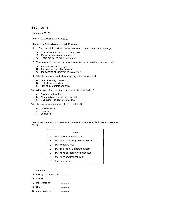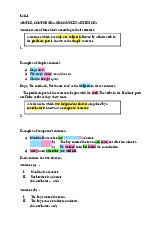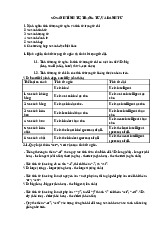








Preview text:
lOMoAR cPSD| 40342981
IELTS Speaking – Topic 1.4: Hobbies and Interests
Câu 1: Do you have any hobbies or interests?
⇒ “Of course yes, tons of them. I like to read a lot, sing a lot, watch a lot of movies and I also like
to design and edit videos. I think this list keeps growing coz I always find other things to try from time to time.”
Câu 2: What do you do in your free time?
⇒ “Well, to be quite honest, I‟m not the one who has much spare time, you know, coz all the study
and over-time job, but if I have, I‟ll stick to one of my hobbies which is reading, singing, watching
movies or designing and editing the videos, or sometimes just‟ve got a sudden idea to go shopping,
I never know. Ah, I‟ve been writing blog for a while – good way to release your thought and feelings, you know.”
▪ Câu này tương tự như câu trên. Hay như các bạn có thể dùng ngay câu trả lời ở trên để trả lời cho
câu này (giống như mình đã làm). Ở đây, ngoài việc dùng lặp lại hoàn toàn câu trả lời trên, mình chỉ
thêm thắt một số ý nữa để nhấn mạnh “in your free time”. spare time th ờ i gian r ả nh over - time job công vi ệ c ngoài gi ờ sudden idea ý tư ở ng ng ẫ u nhiên for a while
m ộ t th ờ i gian, m ộ t lúc
Câu 3: What hobbies / free-time activities are popular in your country?
⇒ “Well, it actually varies in terms of age and gender, too. Young people tend to have a preference
of exciting activities, playing basketball or football or computer games for boys while girls are
certainly a lot more into fashion and umm Korean films. However, the middle age are more likely
to watch TV series or chit-chatting about social issues. And the elderly who usually get up early in
the mornings would prefer to listen to the radios to keep themselves updated or some could spend
time looking after their grandchildren.”
▪ Dạng câu hỏi này rất dễ để đưa ra câu trả lời, nhưng trả lời như thế nào và làm sao kéo dài câu trả
lời mới là cái khó. Đừng có list ra một loạt các hobbies nhé. Một tips cho những dạng câu hỏi như
thế này là hãy nghĩ đến 2 hoặc 3 khả năng, bạn sẽ có hướng đi để phát triển ý. (Ví dụ các bạn có thể
xem phân tích ở dạng câu hỏi “How often?” mà mình đã phân tích trong bài trước.)
▪ Một số cụm từ các bạn có thể sử dụng để mở đầu như:
Well, it actually varies in terms of… lOMoAR cPSD| 40342981
To be honest, I have to say it really depends…
Oh, this is applied / changes / varies for different specific situations…
▪ Sau đó, bạn có thể đề cập đến nội dung sử dụng các cấu trúc ngữ pháp phức. Ví dụ ở đây mình tách
young people, the middle age and the elderly. Mình dùng cấu trúc “While boys like…, girls are more
into…”. Một cách rất hay để phát triển ý đúng không. Hoặc nếu không chia theo tuổi hay giới tính,
các bạn có thể chia theo vùng miền chẳng hạn (While the common activities in city often are…,
soccer is the most prevalent in the countryside.).
▪ Ngoài cách nói này, các bạn có thể phát triển ý bằng cách nói cái gì phổ biến nhất, sau đó đến
những cái phổ biến sau. Cũng là một cách khá hay để phát triển ý.
B1: Bắt đầu bằng các cụm linking phổ biến
Well actually… Of course, you know…
Sure, obviously… Of course, it goes without saying… Ok, certainly…
B2: Sau đó có thể nói đến vấn đề đa dạng của cái mình muốn nói đến
there‟s quite a mixed variety of… there‟s quite a wide range of…
there‟s quite an extensive diversity of… there‟s quite a diverse mixture of…
there‟s a fairly broad range of…
B3: Tiếp đến dùng những cụm này để nói ý thứ nhất
But I guess the most + adj… would probably be…
However, I suppose the most + adj… could possibly be…
Though I think the most + adj… would potentially be…
Yet I imagine the most + adj… may well be…
Still, I suspect that the most + adj… could perhaps be…
B4: (có thể) Giải thích tại sao bạn cho rằng nó phổ biến nhất
The thing with buses is that…
I assume buses are so + adj because…
The point I want to add about buses is that…
And what you have to realise with buses is that
And the explanation for this could be that…
And the basis of this is that…
B5: Miêu tả đối tượng thứ 2 bằng các từ chỉ đường quen thuộc Besides… As well as… In addition to…
Another kind of… would be…
Another form of… worth mentioning could be…
A second variety of… would be something like… lOMoAR cPSD| 40342981
A subsequent category would be something like…
B6: Tương tự bạn có thể nói về lý do (giống như trên)
B7: Miêu tả những loại chung khác mà bạn không miêu tả kỹ
And of course there‟s the usual things like…
And obviously you can also find things like…
Likewise, as might be expected, there are things like…
And naturally, there are things like…
▪ Trên đây là cấu trúc trả lời đầy đủ nếu bạn chọn trả lời theo hướng này. Tuy nhiên hãy cố gắng linh
hoạt khi trả lời nhé. Luyện tập với những cụm trên để nói tự nhiên là rất tốt nhưng khi bạn không tự
tin đừng cố dùng sẽ làm giảm sự tự nhiên của bài nói. Cấu trúc hoàn thiện của câu trả lời có thể như sau:
Câu 1: Of course, it goes without saying there‟s quite an extensive diversity of… (topic).
Câu 2: Still, I suspect that the most… (adj) could perhaps be… (type
1). Câu 3: And what you have to realise with… (type1) is that… Câu 4:
In fact / so / but / because… (detail).
Câu 5: Another form of… (topic) worth mentioning could be… (type 2).
Câu 6: And the main characteristic of… (type 2) is that… (detail) (+ linking word / complex structure).
Câu 7: And naturally, there‟s things like (type 2 or 3).
▪ Một lỗi sai mà các bạn hay mắc phải nữa đó là sử dụng lặp lại từ “popular” rất nhiều trong câu trả
lời. Có rất nhiều từ khác mà các bạn có thể dùng thay thế nên tránh dùng lặp lại nhé. Dưới đây là một số ví dụ: lOMoAR cPSD| 40342981
▪ Từ vựng trong câu trả lời tend to có xu hướng the middle age tuổi trung niên chit-chat nói chuyện phiếm the elderly ngư ờ i già keep someone‟s updated
gi ữ cho mình luôn c ậ p nh ậ t tin t ứ c look after chăm sóc
Câu 4: Is it important to have a hobby? / Why is it important for people to have free-time activities?
“I definitely believe that it‟s very important for a person to have at least one hobby or free time
activity of their own. This can either help you to relax yourself as you have been long time involved
in work and study or calm you down, give you comfort when you are frustrated, you know, like a
stress reliever. In additional to that, it gives you a sense of accomplishment and a feeling of self-
worth, which is essential for you, even sometime you cannot recognize.”
▪ Câu này hoàn toàn quen thuộc rồi phải không ạ. Trả lời và đưa ra lý do. Nếu đưa ra trên 1 lý do (what
you should do), đừng quên thêm từ chỉ đường. Done. Chú ý cách sử dụng cấu trúc either… or… ▪ T ừ v ự ng: be involved in liên quan đ ế n frustrated
tuy ệ t v ọ ng, cáu b ẳ n stress reliever
gi ả i t ỏ a căng th ẳ ng sense of accomplishment c ả m giác thành t ự u feeling of self - worth giá tr ị b ả n thân
Câu 5: Is it harmful to spend too much time on a hobby? lOMoAR cPSD| 40342981
“Well in actual fact, if I think about it, I guess that in many ways hobby cannot influence your
daily work or study, I mean it couldn‟t occupy large quantities of time you have in one day unless
you are aiming at developing your hobby and pursuing it as your career, as I am doing now. But even
so, I have to say that over-indulgence in anything could do more harm than good. I have noticed that
some of my friends spending too much time on video games make themselves too tired to stay awake
during the work or study. In my viewpoint, everything occurs for some reasons. So all in all I guess
my answer would have to be yes and no.”
▪ Thông thường với những câu hỏi dạng này, các bạn thường sẽ trả lời luôn “yes” or “no” và đưa ra lý
do. Điều này không sai nhưng thỉnh thoảng sẽ làm cho câu trả lời của bạn trở nên quá đơn giản về
cấu trúc ngữ pháp. Một cách để cho các bạn trả lời câu này là sử dụng dạng “both yes and no” sau
đó đưa ra lý do giải thích cho “yes” rồi đưa ra lý do giải thích cho “no”. Như vậy bạn sẽ có thể
kéo dài câu trả lời của mình ra đồng thời có cơ hội sử dụng những linking words đa dạng, giúp bạn
tăng điểm trong bài thi. Tất nhiên không phải câu nào cũng nên trả lời như vậy, hãy cố gắng linh
động trong câu trả lời. Sau đây mình đưa ra một số cụm linking các bạn có thể sử dụng khi trả lời kiểu như vậy.
▪ Bạn có thể bắt đầu với các cụm:
Well in actual fact, if I think about it, I guess that in many ways…
OK, well in reality, I suppose that to some extent…
Alright, I guess that on the one hand… Well certainly in some ways…
▪ Sau đó đưa ra ý kiến support cho câu trả lời Yes
▪ Làm rõ hơn câu trả lời bằng các cụm: I mean…
especially when you consider that… particularly
if you think about the point that… especially
with regard to the point that…
and this is definitely the case with…
▪ Sau đó chuyển sang đưa ra ý kiến cho câu trả lời No bằng các cụm:
But you also have to understand that…
Even so, you could also say that…
At the same time you could say that… On the other hand…
▪ Kết thúc bằng một câu kết luận:
So all in all I guess my answer would have to be yes and no.
So on the whole I suppose the answer has to be yes and no.
So all things considered I guess the answer is both yes and no. So
in the main, I suppose the answer is probably yes and no.
▪ Giờ hãy quay lại xem câu trả lời của mình và đối chiếu nhé. Tự viết ra câu trả lời cho riêng mình và luyện tập thêm nhé. lOMoAR cPSD| 40342981
▪ Thực ra những câu như thế này xuất hiện ở Part 3 (Is healthy eating important? Do you think it is
important to plays sports / do physical exercise? Should education free in your country?…) ▪ Từ vựng:
occupy large quantities of time chiếm nhiều thời gian aim at nhắm vào, mục đích over-indulgence
dành quá nhiều thời gian, lạm dụng in my viewpoint theo ý kiến của tôi
Câu 6: What free-time activities would you like to try in the future?
“Well, actually, I‟d really like to have a go at playing the piano. You know, the idea of me singing
and playing it at the same time has hit my mind since I was a little girl. Besides, I do love its sound
which always touches my heart when I feel emotional and also cheers me up a lot when I‟m down.”
▪ T ừ v ự ng: hit one‟s mind
n ằ m trong đ ầ u ai đó touches one‟s heart làm tôi xúc đ ộ ng cheers one‟ up
c ổ vũ tinh th ầ n ai đó
▪ Một số từ vựng khác về chủ để này các bạn có thể dùng cho câu trả lời riêng của mình. Các bạn hãy
tự tra từ điển các từ này để biết nghĩa và cách đọc, cách phát âm của nó nhé. Hãy cố gắng đặt một
câu với một từ, một câu có nghĩa nhé, không đặt đối phó! Nouns leisure pursuit spare time pastime gardening Verbs amuse oneself by unwind by kill time by be crazy about be keen on lOMoAR cPSD| 40342981 Adjectives fascinating cativating time - consuming appealing Idioms take up (= start)
I‟ve recently taken up swimming. take part in
I frequently take part in group activities like. get into (= enjoy)
Recently I‟ve been getting into fishing. have a go at (= try)
I‟d really like to have a go at scuba diving.
idle away the hours (= spend time)
In my time off I often idle away the hours by playing guitar.
Part 1-style questions
Examiner: How would you describe yourself?
Paula: Everyone tells me I take after my mum as I‟m quite laid-back … I think I‟m good company
but you should ask my friends if they agree …
Examiner: In which ways are you similar to your friends?
Manuel: I seem to be attracted to introverts … not people who are painfully shy but most of my
friends are a little reserved … and I think that‟s what I‟m like …
Examiner: Are you similar or different to your brother(s)/sister(s)?
Mira: I think my brother and I are very similar … I‟d say we‟re fun-loving and tend to be a
bit extroverted … my brother is certainly the life and soul of the party … I‟m not sure that applies to me …
Part 2-style task
Describe a teacher you once had who you enjoyed being taught by. You should say • who this person was • when they were your teacher •
which subject they taught you and describe what it was about their character that you liked.
Carolina: I‟d like to describe my English teacher from school … Miss Thomas … this was a few
years ago now and she was my teacher at a time when I was getting a little bored with being at
school … unlike some of the other teachers Miss Thomas never lost her temper … she was very
calm and easy-going … she was also very broad-minded … we were able to ask her questions
about lots of subjects that some other teachers would refuse to discuss which made us respect her
even more … she had a great sense of humour too … she‟d laugh at our jokes as well as making
us laugh … and she would also bend over backwards to help us with our work … she always put
us first and often stayed around at the end of class to talk with anyone who needed help … lOMoAR cPSD| 40342981
apparently she was highly respected within her field but you would never know as she was the type
that hid her light under a bushel … she was very modest and self-effacing … so yes … Miss
Thomas was a teacher I have fond memories of …
Part 3-style questions
Examiner: Which personal qualities do you think we most want to pass on to our children? Martin:
I certainly would want my children to be self-confident and self-assured … I really believe that
people who feel good about themselves are in a good position to face what life has to offer them …
and I‟d hope they wouldn‟t be self-centred … but remembered to think about others …
Examiner: Which characteristics do you think are the least appealing in a person?
Marianne: Well … people who are very narrow-minded are difficult to get on with … it‟s nice
when someone is open to other people‟s opinion and willing to think about their own views … and
people who are two-faced can be a little irritating … relationships are built on trust and without
honesty there‟s not much left …
Examiner: Which personality types do you think are less likely to suffer from stress or anxiety?
Sol: Probably people who are thick-skinned … who don‟t let people or problems affect them too
much … and if you are fair-minded you‟ ll be less likely to overreact to situations or be quicktempered … Definitions •
to be the life and soul of the party: a fun person, someone who is the centre of activity •
to bend over backwards: to try very hard to help someone •
broad-minded: prepared to accept other views or behaviours •
easy-going: relaxed and not easily worried about anything •
extrovert: an energetic person who likes the company of others •
fair-minded: to treat people equally •
fun-loving: to enjoy having fun •
to hide one’s light under a bushel: to hide one‟s talents and skills good company: enjoyable to socialise with •
good sense of humour: the ability to understand what is funny •
introvert: someone who is shy •
laid-back: see „easy-going‟ •
to lose one’s temper: to suddenly become angry
narrow minded: opposite of
„broad-minded‟ (see above)
painfully shy: very shy •
to put others first: to think of others before yourself •
quick-tempered: to become angry quickly reserved: shy
self-assured: confident •
self-centred: thinks only of oneself •
self-confident: believes in one‟s own ability or knowledge •
self-effacing: to not try to get the attention of others (especially in terms of hiding one‟s skills or abilities) •
to take after: to be like (often another member of the family) lOMoAR cPSD| 40342981 •
thick-skinned: not easily affected by criticism •
trustworthy: can be trusted •
two-faced: not honest or sincere. Will say one thing to someone to their face and another when they are not present.




